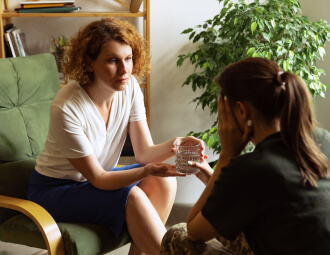Anxiety disorders are common in our demanding society but they might sometimes remain undetected. You may be occasionally worried about upcoming tasks or events, which is a normal psychological state. However, when worries become overwhelming or prolonged, it’s important to seek professional help.
In this article, you’ll find more information about warning signs commonly associated with anxiety disorders. We will also dive deeper into the effects of untreated anxiety and debunk several myths. But before that, let’s review the types of anxiety, their early symptoms, and risk factors.
Types of Anxiety Disorders
- Generalized anxiety disorder (GAD). People with generalized anxiety disorder usually worry excessively and uncontrollably about various aspects of their lives, including their jobs, health, families, and finances.
- Panic disorder. People with a panic disorder experience sudden and recurrent panic attacks. Panic attacks are characterized by severe anxiety symptoms, such as an experience of dread, followed by physical symptoms, including a racing heartbeat, sweating, trembling, and shortness of breath.
- Social anxiety disorder. An extreme fear of social interactions and settings is also known as social phobia. It causes people to avoid social events and activities.
- Specific phobias. These are extreme phobias of particular things, circumstances, or behaviors, such as heights, spiders, flying, or public speaking. Interactions with the triggering objects or situations are accompanied by signs of anxiety.
- Obsessive-compulsive disorder (OCD). The symptoms list of OCD includes recurrent, bothersome thoughts (obsessions) and the need to engage in particular rituals or behaviors (compulsions) to reduce anxiety.
- Post-traumatic stress disorder (PTSD). After experiencing or witnessing a traumatic event, PTSD can develop, causing chronic symptoms like anxiety, nightmares, and flashbacks.
- Illness anxiety disorder. Excessive worry about having or developing a major hidden medical disease is known as an illness anxiety disorder (formerly called hypochondriasis).
- Separation anxiety. A person with separation anxiety worries greatly about being apart from their family or other important individuals. The fear and other psychological symptoms are excessive and inappropriate for the situation.
- Substance-induced anxiety disorder. It is characterized by anxiety, unease, or panic brought on by using or discontinuing a drug. If the substance exacerbates your symptoms or if you already had anxiety before using it, it is not regarded as a substance-induced anxiety disorder.
- Selective mutism. Selective mutism is an anxiety disorder in which a person cannot communicate in particular social contexts, such as with schoolmates or distant relatives. This condition typically begins in childhood and can endure into adulthood if left untreated.
Get help from professionals at MEDvidi to receive a personalized treatment plan for anxiety.
Common Symptoms of Anxiety Disorders
Anxiety can appear in many forms, and people may experience various emotional and physical symptoms. However, there are several common symptoms of anxiety that may show an increased probability of having a disorder. These include:
- Feeling nervous, restless, or tense. A person might feel on edge, uneasy, or on alert most of the time.
- A sense of impending danger, panic, or doom. It is a strong fear and panic occurring without obvious reasons. A person feels like something terrible is about to happen.
- Increased heart rate. The heartbeat is faster than usual, sometimes accompanied by palpitations.
- Breathing rapidly (hyperventilation). Breathing seems quick and shallow, indicating insufficient airflow.
- Sweating. Excessive sweating, especially in stressful situations.
- Trembling. Anxiety-related trembling or shaking of the hands, legs, or other body parts.
- Feeling weak or tired. Anxiety can lead to fatigue and weakness experiences both physically and mentally.
- Trouble concentrating. A person may be unable to think about anything other than the present worry. It is accompanied by difficulty concentrating on activities or other thoughts due to anxiety-related preoccupation.
- Trouble sleeping. Sleep habits may be disturbed by anxiety, making it difficult to get to or stay asleep.
- Experiencing gastrointestinal problems. Anxiety can impact the digestive system, causing problems like diarrhea, nausea, or stomach pain.
- Difficulty controlling worry. Having trouble controlling and managing worrying thoughts, which may resist efforts to suppress them.
- The urge to avoid things that trigger anxiety. A strong urge to stay away from things, places, or situations that increase anxiety or panic.
Explore possible causes of your anxiety symptoms and discover effective treatment options at MEDvidi.
Causes and Risk Factors of Anxiety
Different anxiety disorders have different causes and risk factors that are also linked with unique personal experiences. Some of them commonly associated with anxiety include:
- Stress. Stress is one of the main causes of anxiety. Work pressure, academic pressures, marital problems, financial worries, or significant life changes can bring it on. The hyperactive fight-or-flight reaction may result from chronic stress and cause anxiety symptoms.
- Genetics.
Evidence[3] suggests that anxiety disorders can run in families. If you have a family history of anxiety disorders, you may be at a higher risk of developing one. - Brain chemistry imbalances. Several
neurotransmitters[4] may affect mood, such as serotonin, dopamine, and norepinephrine. Variations or imbalances in these neurotransmitters might cause elevated anxiety levels. - Traumatic experiences. Anxiety disorders can be exacerbated by past stressful events, including physical or mental abuse, accidents, or natural catastrophes. Trauma can have a long-lasting effect on the brain’s fear response and cause anxiety when particular circumstances or triggers occur.
- Medical conditions. Certain medical issues can worsen anxiety. Examples include persistent pain, heart disease, respiratory problems, and thyroid diseases.
- Substance abuse. Abuse of any substance, including alcohol, narcotics, or even caffeine, can exacerbate or cause the onset of anxiety symptoms.
- Social factors. Anxiety disorders can arise as a result of social factors like growing up in a stressful environment, encountering discrimination, or lacking social support.
- Personality traits. Perfectionism and excessive self-criticism are two examples of personality qualities that can make someone more susceptible to anxiety problems.
- Neurological factors. Some anxiety disorders may be influenced by brain irregularities or changes in how the brain is wired and functions.
Anxiety can be caused by a complicated interaction of many elements, and different people may develop this disorder because of various reasons. A mental health specialist can help better understand the causes and create a comprehensive treatment strategy.
Conditions Co-occurring With Anxiety
Various disorders frequently co-occur with anxiety, adding to the difficulties associated with the condition. These include:
- Depression. Depression often arises along with an anxiety disorder. Their symptoms might overlap, making one feel depressed, anxious, and hopeless.
- Obsessive-compulsive disorder (OCD). OCD frequently happens alongside anxiety because obsessive thoughts cause exaggerated worry and fright.
- Substance use disorders. People who struggle with anxiety may resort to drugs or alcohol trying to cope with their emotions, which might result in substance use disorders that worsen their anxiety symptoms.
- Eating disorders. People with eating disorders like anorexia nervosa, bulimia nervosa, or binge-eating disorder, may also have anxiety because of using disordered eating as a coping mechanism.
- Sleep disorders. Anxiety can disrupt sleep cycles, resulting in insomnia or other sleep disorders and increasing anxiety symptoms.
- Attention deficit hyperactivity disorder (ADHD). Impulsivity and concentration issues associated with ADHD may lead to unease, worry, and anxiety.
Accurate diagnosis and successful treatment depend on a thorough understanding of the illnesses co-occurring with anxiety. Taking care of these connected problems can help create an all-encompassing strategy for controlling anxiety and enhancing general well-being.
How Anxiety Symptoms Can Affect Daily Life
Clinical anxiety can significantly affect numerous aspects of life, impairing everyday functioning. The following are a few typical negative effects:
- Emotional distress. Anxiety can result in enduring emotions of fear, concern, and nervousness, making it difficult to feel happiness or contentment.
- Impaired relationships. Due to communication issues, increased irritation, and a tendency to avoid social situations, anxiety can strain relationships with friends, family, and coworkers.
- Social isolation. Feelings of isolation and loneliness can be exacerbated by anxiety, which can cause hiding from social relationships and decreased engagement in social activities.
- Decreased performance at work. Anxiety can impair attention, focus, and judgment, which may lower output and performance at work or in educational settings.
- Issues with physical health. The effects of chronic anxiety on physical health and well-being might include headaches, muscle tension, digestive problems, and exhaustion.
- Sleep issues. Anxiety can cause difficulties falling asleep, frequent awakenings, or restless evenings, which can worsen anxiety symptoms.
- Avoidance behaviors. People with anxiety tend to steer clear of circumstances or activities that make them anxious, which limits their exposure to new experiences and chances for personal development.
- Financial stress. Anxiety can affect financial choices, resulting in excessive spending, hoarding, or avoiding financial obligations.
- Substance addiction. Some people may use alcohol or drugs to cope with their anxiety, which could lead to substance addiction problems.
- Impaired self-esteem. Constant anxiety and self-doubt can destroy the feeling of value by undermining self-esteem and confidence.
Busting 5 Myths About Anxiety Disorder Symptoms
Myth 1: Anxiety is a normal worry. While worry is a natural human emotion, anxiety disorders go beyond everyday concerns. Excessive, persistent, and uncontrollable worry can interfere with daily life and requires professional help.
Myth 2: Anxiety is not a serious condition. Anxiety disorders are mental health issues that can seriously affect daily life. Ignoring or negating anxiety can result in further problems.
Myth 3: You can simply “snap out” of anxiety. Anxiety is not something one can choose or readily control. To manage it effectively, you need compassion, encouragement, and professional assistance.
Myth 4: Anxiety is only caused by stress. While anxiety disorders can be caused by stress, various other things, like genetics, brain chemistry, and life experiences, can make the symptoms worse.
Myth 5: Only adults experience anxiety. People of all ages, including children and teenagers, can experience anxiety. Early identification and treatment of anxiety can increase the chances of successful treatment.
When to Speak to a Healthcare Provider?
If anxiety symptoms significantly affect your everyday life and well-being, consider seeing a healthcare provider. These are some cues that it might be time to contact a mental health professional for assistance:
- Excessive worry and difficulty coping with it.
- Persistent intensity of symptoms.
- Changes in behavior such as increased irritability and restlessness.
- Avoidance of certain situations, places, or activities due to overwhelming feelings of anxiety.
- Experiencing physical symptoms of anxiety.
- Impact on relationships.
In Conclusion
Mental health professionals can help you better understand when your symptoms are a normal reaction to daily stresses and when they indicate an anxiety disorder. You can explore potential causes of anxiety and receive a personalized holistic treatment plan. Contact MEDvidi today to have an appointment within 24 hours and start your journey toward a calmer and more fulfilling life.
Frequently Asked Questions
How do I know if I have anxiety?
Common symptoms of anxiety disorders include excessive worrying, restlessness, trouble concentrating, anger, and physical symptoms such as a faster heartbeat or increased sweating. However, only a qualified healthcare professional can make a legitimate diagnosis. If you believe you may have an anxiety disorder, consider consulting a professional.
How do people with anxiety act?
When someone feels anxious, they could avoid particular situations, have anxiety attacks, feel overwhelmed, or have difficulties sleeping. Different people are affected by anxiety in different ways and may not exhibit identical behaviors.
How do I stop my anxiety?
Self-help strategies include relaxation techniques, regular physical activity, and a healthy lifestyle. Sometimes, these tips are not enough, and psychotherapy, counseling, or pharmacological treatment are necessary. It could take some trial and error before you and your healthcare provider figure out what works best for you.
What are the extreme symptoms of anxiety?
Severe panic episodes, uncontrollable fear or terror, breathing problems, chest pain, feeling removed from reality, and avoiding routine activities due to excessive worry are just a few of the extreme symptoms of anxiety.
What does an anxiety attack look like?
A panic attack or an anxiety attack is characterized by extreme fear or discomfort, a rapid heartbeat, shortness of breath, shaking, sweating, disorientation, and a sense of losing control. Although it can be overwhelming, it normally passes after a short while. Speaking with a healthcare provider is crucial if you frequently experience panic attacks.













